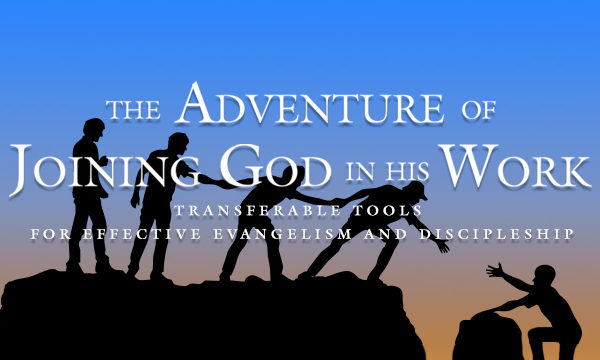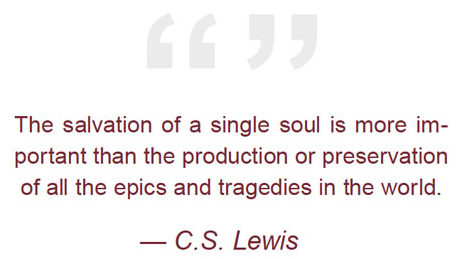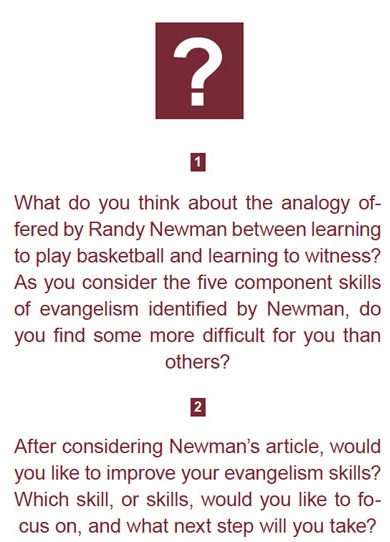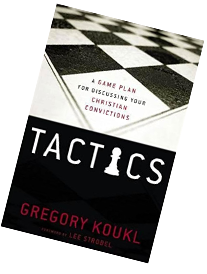Back to series


Recommended Reading:

Download or Listen to Audio
Putting Together the Pieces of the Evangelism Puzzle
Click here to open a Print - Friendly PDF
 Despite the best efforts by evangelists to convince their fellow Christians that sharing the gospel is easy, most of us still find it intimidating. People sometimes suggest that sharing my faith must be natural and simple for me. After all, I’m a “Senior Teaching Fellow for Apologetics and Evangelism.” Nothing could be further from the truth. When I started serving with the C.S. Lewis Institute, I asked if my title could be “Evangelistic Chicken.” My request was denied.
Despite the best efforts by evangelists to convince their fellow Christians that sharing the gospel is easy, most of us still find it intimidating. People sometimes suggest that sharing my faith must be natural and simple for me. After all, I’m a “Senior Teaching Fellow for Apologetics and Evangelism.” Nothing could be further from the truth. When I started serving with the C.S. Lewis Institute, I asked if my title could be “Evangelistic Chicken.” My request was denied.
I do think evangelism can be viewed as slightly less difficult if we break it down into component parts, like pieces of a puzzle. Perhaps a different analogy would help. Learning to witness has similarities to learning to play basketball. I know. Most of us can’t play basketball very well. Even worse, when we compare ourselves to the magicians in the NBA, we don’t even want to imagine what we’d look like on the court.
But consider that the component elements of the game are the same, regardless of the level of the players’ skill. While a tiny minority of athletes make it into the NBA, many people, young to old, enjoy playing the game in local leagues or at pick-up games on neighborhood courts. If you examine the game, you’ll see it’s made up of just a few basic skills, woven together, and employed as a team.
Five basic skills of the sport are shooting, dribbling, passing, moving without the ball, and defense. (Perhaps we could list more skills. For the sake of illustration, let’s limit it to these five). When my sons were young, they played in local leagues with a number of coaches. The first years of learning the sport focused on practicing the individual skills in noncompetitive situations. The boys would practice foul shot after foul shot from the free-throw line. Then they’d do the same with layups. Then came jump shots from numerous places on the court.
 I remember marveling at the patience of one particular coach who had the boys dribble, seemingly for hours, with just one hand. Then they’d repeat with the other hand. They’d expand their dribbling repertoire by dribbling back and forth from one hand to the other, then dribbling while walking, then while running, etc. The coach broke the game down into component parts, honing each to fluidity. Only then would he have the boys incorporate the parts into a seamless whole. Finally they mixed all these ingredients into a team sport that led to a lot of fun and a high percentage of victories. Over time the boys developed a kind of “court-sense” and knew intuitively when to shoot, when to pass, where to move without the ball, where to dribble with it, and when to switch to defense.
I remember marveling at the patience of one particular coach who had the boys dribble, seemingly for hours, with just one hand. Then they’d repeat with the other hand. They’d expand their dribbling repertoire by dribbling back and forth from one hand to the other, then dribbling while walking, then while running, etc. The coach broke the game down into component parts, honing each to fluidity. Only then would he have the boys incorporate the parts into a seamless whole. Finally they mixed all these ingredients into a team sport that led to a lot of fun and a high percentage of victories. Over time the boys developed a kind of “court-sense” and knew intuitively when to shoot, when to pass, where to move without the ball, where to dribble with it, and when to switch to defense.
Evangelism, I believe, can also be broken down to a few component skills:
presenting a concise summary of the gospel
sharing your personal testimony
answering apologetic questions
asking stimulating questions
offering invitations.
Let’s take a brief look at each. As we engage in more and more conversations, we’ll develop a kind of “court-sense” and know what to say, how to say it, when to listen, and where to point people.
1. Presenting a Concise Summary of the Gospel
First, we need a clear presentation of the gospel. We need to communicate four essential components:
-some things about God
-some things about people
-some things about Jesus
-some things about our response
Within each of these four, we could say hundreds of things. But I find that only two are necessary for each point:
-God is both holy and loving.
-People are created in God’s image, but they’ve become sinful.
-Jesus died and rose again.
-Everyone needs to respond with repentance and faith.
 In numerous training seminars I have conducted, I offer this concise outline and people find it easy to memorize in just a few minutes. I’m not suggesting we should blurt out all of this in one brief soliloquy. As we meet with a friend over a cup of coffee, we can deliver each point and see how the listener responds to each. Having the outline firmly settled in our own thinking can help us express our beliefs clearly and winsomely.
In numerous training seminars I have conducted, I offer this concise outline and people find it easy to memorize in just a few minutes. I’m not suggesting we should blurt out all of this in one brief soliloquy. As we meet with a friend over a cup of coffee, we can deliver each point and see how the listener responds to each. Having the outline firmly settled in our own thinking can help us express our beliefs clearly and winsomely.
This four-point outline is not unlike gospel presentations you may have seen in a variety of booklets (e.g., “Two Ways to Live”; “Knowing God Personally”). But I have found that many people today are wary of booklets or slick brochures. They respond far better to the same information delivered in a conversation or seeing some handwritten words on a piece of paper. Today, slick is out. Conversation is in.
2. Sharing Your Personal Testimony
Second, we need to be ready to share our story of how we came to faith. I recommend you plan this out ahead of time. It’s hard to recount the story concisely if you haven’t plotted it out ahead of time. We want to tell people what our lives were like before we came to faith, how we heard and responded to the gospel message, and what difference it has made in our lives. But people may not have as much time as we’d like. We need a one-minute version of the personal story. If they ask for more, we should be ready to offer two or three more minutes. If they want still more, then we can present the extended version.
Here are a few suggestions for preparing a short presentation of your testimony for evangelistic settings. To begin, filter out the details that don’t help a non-Christian understand the gospel.
 To be sure, there were many moving, emotional, exciting, and dramatic moments in your story. But they may not help your friends consider the gospel for themselves. In fact, if some of your story was really unusual, they may just think you’re odd or that the Christian faith can only come to people who have wildly dramatic experiences.
To be sure, there were many moving, emotional, exciting, and dramatic moments in your story. But they may not help your friends consider the gospel for themselves. In fact, if some of your story was really unusual, they may just think you’re odd or that the Christian faith can only come to people who have wildly dramatic experiences.
Another suggestion is to weave clear statements of gospel truth into your story. Take a look at how Paul shared his testimony in Acts 26:2–23. Paul certainly told the unique details of his Damascus Road encounter with Jesus. But he also, rather wisely, inserted theological truths such as the need for repentance (v. 20), the connections between Moses and the Prophets (v. 22), the Messiah’s suffering and resurrection (v. 23), and the universality of the need for salvation (v. 23).
He could have recounted his personal experience and left those theological points out. That would have been an accurate report. But it would have also been a wasted opportunity for evangelism.
Finally, be sure to emphasize how the gospel is making a difference in your life right now, not just what happened long ago. People need to hear what happened to you back then. But they also need to know what’s happening in you right now.
3. Answering Apologetic Questions
Third, we should equip ourselves with some answers to common apologetic questions. Fortunately, the task isn’t as daunting as it may seem. There really are only a handful of questions most people ask. We live in a time of great apologetic wealth, so we should avail ourselves of the riches of books, videos, and websites at our fingertips. In fact, apologetics may be easier today than ever before. You don’t need to sound as brilliant or as polished as Tim Keller. Just point people to YouTube videos and other websites and let those experts do the heavy lifting for you.
4. Asking Stimulating Questions
 Fourth, we need ever-improving conversational skills. I’ve stated it as “asking stimulating questions,” because I think that’s the starting point. But growing as good listeners, empathic encouragers, and common-ground cultivators also plays a vital role in loving our neighbors and pointing them to the Savior.
Fourth, we need ever-improving conversational skills. I’ve stated it as “asking stimulating questions,” because I think that’s the starting point. But growing as good listeners, empathic encouragers, and common-ground cultivators also plays a vital role in loving our neighbors and pointing them to the Savior.
Here’s a simple exercise that can make dramatic improvement in your conversational evangelistic efforts. When people share something about themselves, try to resist the temptation to match their experience with one of your own. Rather than “I’ve had the same experience,” ask them a question so they tell you more about themselves or their experience. Keep drawing them out, so you learn more about them and find connection points between their lives and the gospel. They may respond by asking you questions that could lead to eternally significant exchanges.
5. Offering Invitations
Finally, we need to become winsome inviters. Asking God for the boldness to ask people to join us at a Bible study, an evangelistic event, or a church worship service should be high on our regular prayer list. That can pave the way for the ultimate invitation — asking people to take that step of faith to trust Jesus as Lord and Savior.
There’s one last but crucial comparison to keep in mind. Both basketball and evangelism are team sports. Don’t be a ball hog. Introduce outsiders to insiders, invite people to settings where they’ll hear the gospel, and see how it plays out in a diversity of people’s lives. Take a rest on the bench every so often, and let one of your teammates take a turn —such as your pastor and others who preach, other members of your church, apologists on the web, authors of books, and others who have expertise you don’t have.
I’m still not saying evangelism will be easy for most of us. But we don’t need to be immobilized by fear so that we say nothing. By considering the component parts of the process, working on them individually, and asking God to use our efforts for his glory, we can “play the game” of outreach with great joy and much fruit.

Randy Newman
Senior Fellow for Apologetics and Evangelism, CSLIRandy Newman (1956-2024) was the Senior Fellow for Apologetics and Evangelism at the C.S. Lewis Institute. He taught at several evangelical seminaries. After serving for over 30 years with Campus Crusade for Christ, he established Connection Points, a ministry to help Christians engage people’s hearts the way Jesus did. He has written seven books, Questioning Evangelism, Corner Conversations, Bringing the Gospel Home, Engaging with Jewish People, Unlikely Converts: Improbable Stories of Faith and What They Teach Us About Evangelism, Mere Evangelism. and his most recent, Questioning Faith: Indirect Journeys of Belief through Terrains of Doubt. Randy has also written numerous articles about evangelism and other ways our lives intertwine with God’s creation. He earned his MDiv and PhD in Intercultural Studies from Trinity International University. Randy went home to be with the Lord in May 2024.

Recommended Reading:
Gregory Koukl, Tactics: A Game Plan for Discussing Your Christian Convictions (Zondervan, 2009
In a world indifferent or even opposed to Christian truth, followers of Christ must be better equipped to communicate the timeless of the Christian faith. But how do you have a conversation with someone who is intent on proving you wrong and won't accept the Bible as a source of authority?
In Tactics, Gregory Koukl demonstrates how to artfully regain control of conversations, keeping them moving forward in constructive ways through thoughtful diplomacy. You'll learn how to maneuver comfortably and graciously through the minefields of a challenging discussion, how to stop challengers in their tracks, and how to turn the tables on question or provocative statement. Most importantly, you'll learn how to get people thinking about Jesus.
Drawing on extensive experience defending Christianity in the public square, Koukl shows you how to:
• Initiate conversations effortlessly
• Present the truth clearly, cleverly, and persuasively
• Graciously and effectively expose faulty thinking
• Skillfully manage the details of dialogue
• Maintain an engaging, disarming style even under attack
Tactics provides the game plan for communicating the compelling truth about Christianity with confidence and grace.
 COPYRIGHT: This publication is published by C.S. Lewis Institute; 8001 Braddock Road, Suite 301; Springfield, VA 22151. Portions of the publication may be reproduced for noncommercial, local church or ministry use without prior permission. Electronic copies of the PDF files may be duplicated and transmitted via e-mail for personal and church use. Articles may not be modified without prior written permission of the Institute. For questions, contact the Institute: 703.914.5602 or email us.
COPYRIGHT: This publication is published by C.S. Lewis Institute; 8001 Braddock Road, Suite 301; Springfield, VA 22151. Portions of the publication may be reproduced for noncommercial, local church or ministry use without prior permission. Electronic copies of the PDF files may be duplicated and transmitted via e-mail for personal and church use. Articles may not be modified without prior written permission of the Institute. For questions, contact the Institute: 703.914.5602 or email us.
-
Recent Podcasts
The Emergence of Evangelical Discipleship
by Aimee Riegert, Tom Schwanda on July 11, 2025Evangelical Discipleship: What can we learn from the...Read More
-
Reasoning Requires Faith – Jeffrey Geibel’s Story
by Jeffrey Geibel on July 4, 2025
-
Fix Your Eyes Upon Jesus
by Steven Garber, Aimee Riegert on June 27, 2025
-
Recent Publications
Are Miracles Possible
by Christopher L. Reese on June 1, 2025The 21st century has provoked many conversations and...Read More
-
Is God Just, Not Fair?
by Jennifer Rothschild on May 15, 2025
-
Seeking Dietrich Bonhoeffer
by Joseph A. Kohm on April 29, 2025
0
All Booked
0.00
All Booked
0.00
All Booked
24720
The Adventure of Joining God in His Work Live Online Small Group 7:00 PM CT
https://www.cslewisinstitute.org/?event=the-adventure-of-joining-god-in-his-work-live-online-small-group-700-pm-ct&event_date=2025-09-16®=1
https://www.paypal.com/cgi-bin/webscr
2025-09-16

Next coming event
Days
Hours
Minutes
Seconds
The Adventure of Joining God in His Work Live Online Small Group 7:00 PM CT
On September 16, 2025 at 7:00 pmSpeakers

Randy Newman
Senior Fellow for Apologetics and Evangelism, CSLI
Team Members

Randy Newman
Senior Fellow for Apologetics and Evangelism, CSLIRandy Newman (1956-2024) was the Senior Fellow for Apologetics and Evangelism at the C.S. Lewis Institute. He taught at several evangelical seminaries. After serving for over 30 years with Campus Crusade for Christ, he established Connection Points, a ministry to help Christians engage people’s hearts the way Jesus did. He has written seven books, Questioning Evangelism, Corner Conversations, Bringing the Gospel Home, Engaging with Jewish People, Unlikely Converts: Improbable Stories of Faith and What They Teach Us About Evangelism, Mere Evangelism. and his most recent, Questioning Faith: Indirect Journeys of Belief through Terrains of Doubt. Randy has also written numerous articles about evangelism and other ways our lives intertwine with God’s creation. He earned his MDiv and PhD in Intercultural Studies from Trinity International University. Randy went home to be with the Lord in May 2024.






